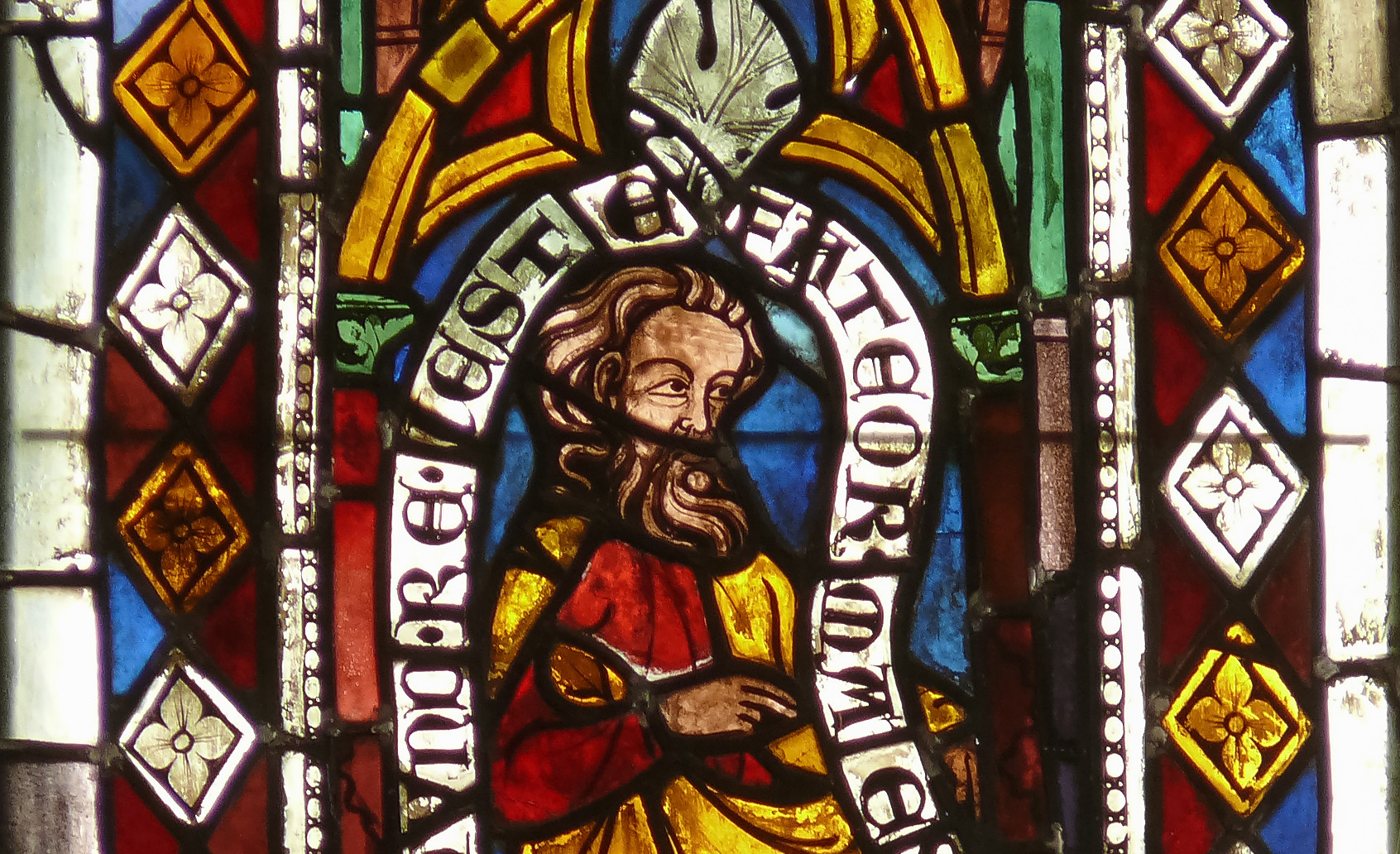Got a question for Philologos? Ask him yourself at [email protected].
Last week’s column ended with the question of why Plato’s 19th-century translator Benjamin Jowett chose to render Socrates’ observation in the Phaedo that we see the world around us “in images” as of our seeing it “through a glass darkly,” a phrase taken from a New Testament epistle of Paul’s.
Was Jowett, as some have thought, seeking to Christianize Plato? One suspects that, on the contrary, he was seeking to Platonize Paul.
Plato and the Socrates of the Platonic dialogues introduced into Western philosophy the notion that the world of our everyday sensory experience is an imperfect version of a more perfect reality that we can grasp only with our intellects. A cabbage, a cat, a melody, a beautiful face, a just act—all are blurred representations of an ideal vegetable, animal, musical structure, vision of beauty, or concept of justice that life as we know it falls short of. In the famous metaphor in Plato’s lengthy dialogue Republic, human society is compared to a band of cave dwellers permanently seated with their backs to the cave’s entrance. Beyond the entrance is a real world they cannot see; visible to them are only the shadows projected by the light behind them on the cave’s rear wall that is in front of them. We live, says Plato, in a world of shadows that are mistaken for reality by all but the philosopher.
It is impossible to overstate the influence of Platonic idealism on the history of philosophy, just as it is impossible to exaggerate that of the empiricist challenge to it that started with Plato’s pupil Aristotle. It has been said indeed, no doubt exaggeratedly, that all thinking persons are by nature either Platonists or Aristotelians—and Paul, Jowett was implying, was a Platonist. In this earthly life, Paul wrote in his first Epistle to the Corinthians, we see divine truth as though reflected in a cloudy mirror. In the next life (whether this will be in another world or in a transfigured this-world, Paul does not say), we shall see it “face to face.” Paul’s metaphor of reflections in a mirror, it is true, differs from the Republic’s metaphor of shadows on a cave wall—but in the Phaedo, as we saw last week, Plato also compares our perception of ultimate reality to things seen “reflected in water or in some similar medium.” The two images are equally Platonic.
However, Paul was not just a Christian influenced, as Jowett saw it, by Plato and by the Middle Platonism of his Graeco-Roman age. He was also an educated Jew and knew very well that his “but then [we shall see] face to face” was based on two verses in the Hebrew Bible. The first of these, Exodus 33:11, tells us that in Sinai “God spoke to Moses face to face, as a man speaks to a companion.” The second, Deuteronomy 34: 10, the antepenultimate verse of the Pentateuch, sums up the narrative of Moses’ life and death by saying, “And never again was there a prophet in Israel like Moses, whom God knew face to face.” In the future, Paul promises the Christians of Corinth, he (and they with him) “shall know even as I am known”—that is, their knowledge of God will be direct like that of Moses.
Plato, of course, knew nothing of Moses, while Paul for his part did not need anyone’s assistance to apply Platonic imagery to Moses. And yet there is a possible link among Plato, Paul, and Moses that might also be the link between Paul’s “now we see at through a glass darkly but then we shall see face to face” and the tractate of Y’vamot’s “the prophets saw in a mirror that was not bright while Moses saw in a mirror that was bright.” This link, I propose, is Philo of Alexandria.
Philo is a unique figure in Jewish history, a Greek-speaking Jew of the 1st century CE who wrote voluminous expositions and defenses of Judaism in a philosophic and semi-Platonic vein. A contemporary of Paul’s, he is not mentioned in rabbinic sources and there is no evidence that any of the ancient rabbis was familiar with his work (which is no proof that none were); nor is it clear how well-versed he himself was in the early rabbinic tradition of his times, although he evidently had at least a superficial knowledge of some of it. His writings were valued and preserved by the Christian church fathers; had their survival depended on his fellow Jews, they would have been lost.
And now let us quote some lines from Philo’s An Allegorical Interpretation of Genesis, Part III, Section 33. This passage occurs in the course of a comparison made by Philo between Moses and Betsalel, the master craftsman put in charge by Moses of constructing the Tabernacle. After observing that Betsalel means “in the shadow of God” (Hebrew b’tsel el), Philo continues, as translated in the Loeb Classical Library edition of his works:
There is a mind more perfect and more thoroughly cleansed [than Betsalel’s], which has undergone initiation into the great mysteries, a mind that gains its knowledge of the First Cause not from created things, as one may learn the substance from the shadow, but, lifting its eyes above and beyond creation, obtains a clear vision of the uncreated One. . . . The mind of which I speak is Moses, who says [Exodus, 33:13], “Manifest Thyself to me, let me see Thee that I may know Thee,” [by which he meant], “For I would not that Thou shouldst be manifested to me by means of heaven or earth or water or air or any created things at all, nor would I find the reflection of Thy being in aught else than in Thee Who art God, for the reflections in created things are dissolved, but those in the Uncreated will continue abiding and sure and eternal.”
Note that Philo begins this passage about Moses with the Republic’s metaphor of seeing the shadows of true existence and shifts in mid-course to the Phaedo’s metaphor of seeing true existence’s reflections. And while Philo fails to specify the medium in which such reflections are “manifested” and “dissolved,”—that is, come and go—and may have been thinking like Plato of water, the Greek word he uses in the phrase “nor would I find the reflection of Thy being in aught else than in Thee Who art God,” katoptridzo, means “to behold in a mirror” and derives from the noun kàtoptron, a mirror of polished metal. The noun used by Paul in “though a glass darkly,” eisoptron, is practically the same.
Could Paul have been directly or indirectly familiar with this passage from Philo? (He may have spoken with someone who had read Philo rather than read Philo himself.) It’s possible. Could the rabbis have had similar knowledge of it when they spoke of Moses seeing God in a mirror that was bright or polished? That’s possible, too. Or perhaps it was the other way around and Philo knew of a Platonically inspired rabbinic metaphor for Moses’s knowledge of God that was already in circulation long before being recorded in Y’vamot. This metaphor, in any case, differs from both Paul’s and Philo’s, since according to it, not even Moses could dispense with seeing God’s reflection rather than God Himself. He alone, however, Y’vamot states, saw it with perfect clarity.
Which leaves us with one last puzzling question. If the King James’s “glass” as a translation of Paul’s eisoptron means, as we have said it does, “looking glass,” i.e., mirror, how does one see through it, darkly or not, when a mirror is precisely something that cannot be seen through because it reflects light rather than transmits it? We’ll try to answer this next week in our third and concluding column on the subject.
Got a question for Philologos? Ask him yourself at [email protected].
More about: Hebrew Bible, History & Ideas, Plato







